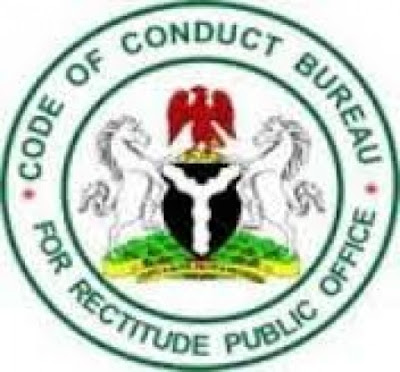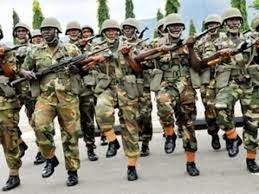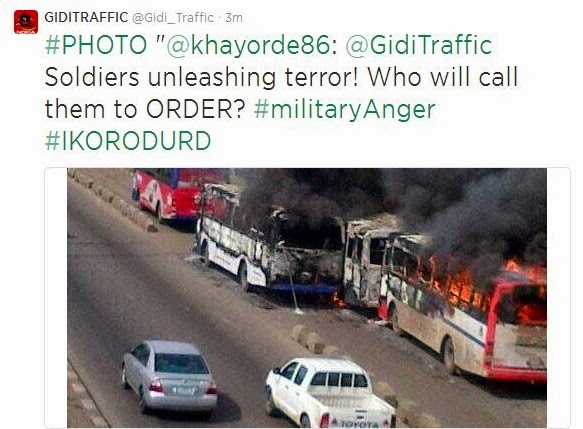
A few things about the Code of Conduct Tribunal (CCT)

The
Code of Conduct Tribunal is established by Section
15(1) of the Fifth Schedule, of the
1999 Constitution of the Federal Republic of Nigeria. It provides that –
Code of Conduct Tribunal is established by Section
15(1) of the Fifth Schedule, of the
1999 Constitution of the Federal Republic of Nigeria. It provides that –
“There shall be
established a tribunal to be known as Code of Conduct Tribunal which shall
consist of a Chairman and two other persons.”
established a tribunal to be known as Code of Conduct Tribunal which shall
consist of a Chairman and two other persons.”
By
virtue of the further provisions in Section
15, the Chairman of the tribunal must be qualified to hold office as a
Judge of a superior court in Nigeria. Also the Chairman and other two members
are appointed by the President on the recommendation of the National Judicial
Council.
virtue of the further provisions in Section
15, the Chairman of the tribunal must be qualified to hold office as a
Judge of a superior court in Nigeria. Also the Chairman and other two members
are appointed by the President on the recommendation of the National Judicial
Council.
The
Chairman’s tenure of office ends when attaining the age of 70 and the Chairman
cannot be removed by the President except upon an address supported by
two-thirds majority of each House of the National Assembly praying that he be
so removed for inability to discharge the functions of the office.
Chairman’s tenure of office ends when attaining the age of 70 and the Chairman
cannot be removed by the President except upon an address supported by
two-thirds majority of each House of the National Assembly praying that he be
so removed for inability to discharge the functions of the office.
According
to section 18, where the Code of Conduct Tribunal finds a public officer guilty
of contravening any of the provisions of the Code of conduct for public
officers, such public officer may be directed to vacate the office or seat in
any legislative house as the case may be, or, be disqualified from membership
of a legislative house and from holding
any public office for a period of 10 years or seizure and forfeiture to the
State of any property acquired in abuse or corruption of office. These above
stated penalties are without prejudice to any penalty that may be given by a
Court if the offence is of a criminal nature.
to section 18, where the Code of Conduct Tribunal finds a public officer guilty
of contravening any of the provisions of the Code of conduct for public
officers, such public officer may be directed to vacate the office or seat in
any legislative house as the case may be, or, be disqualified from membership
of a legislative house and from holding
any public office for a period of 10 years or seizure and forfeiture to the
State of any property acquired in abuse or corruption of office. These above
stated penalties are without prejudice to any penalty that may be given by a
Court if the offence is of a criminal nature.
Being
a code of conduct for Nigerian public officers, according to the Constitution,
the tribunal has jurisdiction over any of the following persons including;
a code of conduct for Nigerian public officers, according to the Constitution,
the tribunal has jurisdiction over any of the following persons including;
i.
The President and
Vice-President.
The President and
Vice-President.
ii.
The President and
Deputy-Speaker of the Senate, House of Representatives and Speakers and
Deputy-Speakers of Houses of Assembly of States, and all members of legislative
houses.
The President and
Deputy-Speaker of the Senate, House of Representatives and Speakers and
Deputy-Speakers of Houses of Assembly of States, and all members of legislative
houses.
iii.
Governors and
Deputy-Governors.
Governors and
Deputy-Governors.
iv.
Chief Justice of Nigeria,
Justices of the Supreme Court, Court of Appeal, other judicial officers and all
staffs of the court of law.
Chief Justice of Nigeria,
Justices of the Supreme Court, Court of Appeal, other judicial officers and all
staffs of the court of law.
v.
Attorney- General of the
Federation and States.
Attorney- General of the
Federation and States.
vi.
Ministers of the Federal
Government and Commissioners of State Governments.
Ministers of the Federal
Government and Commissioners of State Governments.
vii.
All Chiefs of the armed
forces.
All Chiefs of the armed
forces.
viii.
Inspector- General of
Police, all members of the police and security agencies.
Inspector- General of
Police, all members of the police and security agencies.
ix.
Secretary to the
Government and Head of the Civil Service including permanent secretaries and
all members of the civil service, either Federal or State.
Secretary to the
Government and Head of the Civil Service including permanent secretaries and
all members of the civil service, either Federal or State.
x.
Ambassadors, High
Commissioners and other officers of Nigerian missions abroad.
Ambassadors, High
Commissioners and other officers of Nigerian missions abroad.
xi.
Chairman and members of
local government councils.
Chairman and members of
local government councils.
xii.
Chairman and members of statutory
corporations.
Chairman and members of statutory
corporations.
xiii.
All staffs of Universities
and institutions owned or financed by the Federal or State Government.
All staffs of Universities
and institutions owned or financed by the Federal or State Government.
xiv.
Chairman and members of
staff of permanent commissions or councils appointed on full time basis.
Chairman and members of
staff of permanent commissions or councils appointed on full time basis.
Adedunmade
Onibokun, Esq.
Onibokun, Esq.
@adedunmade


